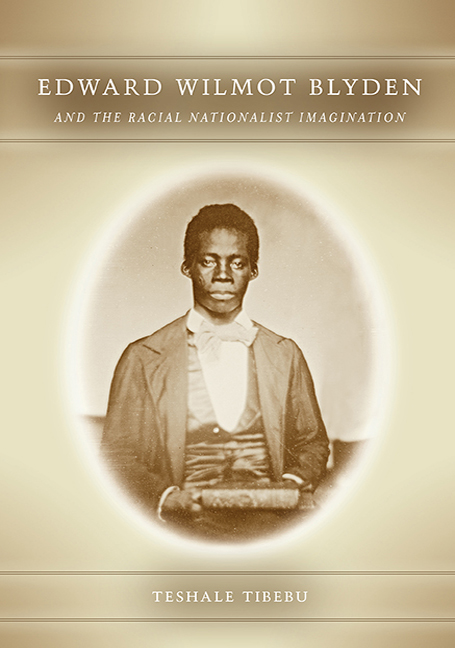Book contents
- Frontmatter
- Dedication
- Contents
- Acknowledgments
- Introduction
- 1 Africa: Service, Suffering, and Subjection
- 2 The Critique of Eurocentrism
- 3 Ishmael in Africa: Black Protestant Islamophilia
- 4 The African American “Civilizing Mission”
- 5 The “Mulatto” Nemesis
- 6 Appraising the Colonial Enterprise
- Epilogue: Post-Blydenian Reflections
- Notes
- Bibliography
- Index
1 - Africa: Service, Suffering, and Subjection
Published online by Cambridge University Press: 08 April 2017
- Frontmatter
- Dedication
- Contents
- Acknowledgments
- Introduction
- 1 Africa: Service, Suffering, and Subjection
- 2 The Critique of Eurocentrism
- 3 Ishmael in Africa: Black Protestant Islamophilia
- 4 The African American “Civilizing Mission”
- 5 The “Mulatto” Nemesis
- 6 Appraising the Colonial Enterprise
- Epilogue: Post-Blydenian Reflections
- Notes
- Bibliography
- Index
Summary
The glory of the African thus far has been the glory of suffering—the glory of the cross—the glory of the Son of Man—the man of sorrows and acquainted with grief. But the future will have a different story to tell. The Cross precedes the Crown.
—Blyden, Study and RaceBlyden sees the history of Africans as a history of serving humanity, both materially and spiritually. Indeed, he is of the opinion that the glory of Africa lies in serving humanity. This view is central to Blyden's philosophy of history. As a Christian minister, he draws parallels between the trials and tribulations of Jesus and that of the Africans. He writes, “If service rendered to humanity is service rendered to God, then the Negro and his country have been, during the ages, in spite of unwanted influences, tending upward to the Divine.” As such, “Shem and Japheth have largely participated in the guilt of the enslavement of Ham. Shem, having lagged behind Japheth in the march of enlightenment, persists in the perpetration of the hideous wrong. But, under pressure, the dilatory brother is being urged on to his duty” (323). He further states that although all races have passed through the fire of slavery as part of their journey toward civilization, no one had suffered as much from it as Africans. “Africa has been spoiled by all the races alien to her, and, under their stimulating example, by her own sons. Other races have passed through the baptism of slavery, as a stepping-stone to civilization and independence, but none has toiled under the crushing weight of a servitude so protracted and inflicted from so many sources.” He adds,
Millenniums mark the period of bondage and humiliation of Africa's children. The four quarters of the globe have heard their groans and been sprinkled and strained with their blood. All that passed by have felt at liberty to contemn and plunder. The oppressors of this race [Negroes] have been men with religion, and men without religion—Christians, Mohammedans, and Pagans. Nations with the Bible, and nations with the Koran, and nations without Bible or Koran—all have joined in afflicting this continent. And now the last of her oppressors, tearing from her bosom annually half a million of her children, are nations with the Koran. (323–24)
- Type
- Chapter
- Information
- Publisher: Boydell & BrewerPrint publication year: 2012

